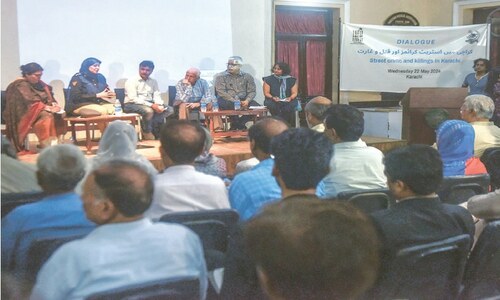KARACHI: Speakers at a workshop highlighted the implementation status of Sindh’s climate change-related awareness policies plans and programmes, while identifying gaps and suggesting targeted solutions.
The event on climate change education, training, and public awareness was organised by the World Wide Fund for Nature-Pakistan (WWF-P) at a local hotel.
The scheduled interactive working group sessions with experts and participants culminated in formulation of Sindh-specific critical pathways for enhancement of education, training, and public awareness.
This was the final workshop from a series of events organised at the provincial level, under the TNC.
At the beginning of the event, Director General, National Institute of Oceanography, Dr Samina Kidwai shared a comprehensive overview of climate change and oceans and said: “There is a strong linkage between oceans and climate change; oftentimes an overlooked issue. It is critical for us to act on it immediately.”
In his welcome note, senior director programmes, WWF-Pakistan, Dr Masood Arshad, said: “At present, it is common knowledge that climate change has severe impacts on Pakistan, we must now look towards solution and adaptation.” Talking about the Third National Communication (TNC) process, he highlighted the roles of various implementing partners and underscored the importance of reporting requirements to the United Nations Framework Convention on Climate Change (UNFCCC).
Nazifa Butt, Senior Manager Climate and Energy Program, WWF-Pakistan briefed the participants on the preparation under way for the TNC.
Chief Adviser, Curriculum Wing with the Education and Literacy Department, Government of Sindh, Dr Fouzia Khan, presented the current implementation efforts on education, training, and public awareness of Climate Change in the province, highlighting progress and gaps.
She observed that the Education & Literacy Department understands the learning losses that arise from climate-related emergencies, and is actively pursuing the design of a DRR curriculum framework.
She further noted that the building of curriculum alone will serve little to no purpose unless there are adequate teacher training programs to ensure content is delivered effectively.
In his closing remarks the Director Operations, Provincial Disaster Management Authority (PDMA), Sindh Imdad Hussain Siddiqui stated that “The Third National Communication is a critical effort to report on the climate change issues in Pakistan, and provide an important basis for formulation of our Nationally Determined Contributions.” He congratulated the organisers for conducting the workshop successfully and involving key stakeholders.
Published in Dawn, September 22th, 2023













































Dear visitor, the comments section is undergoing an overhaul and will return soon.